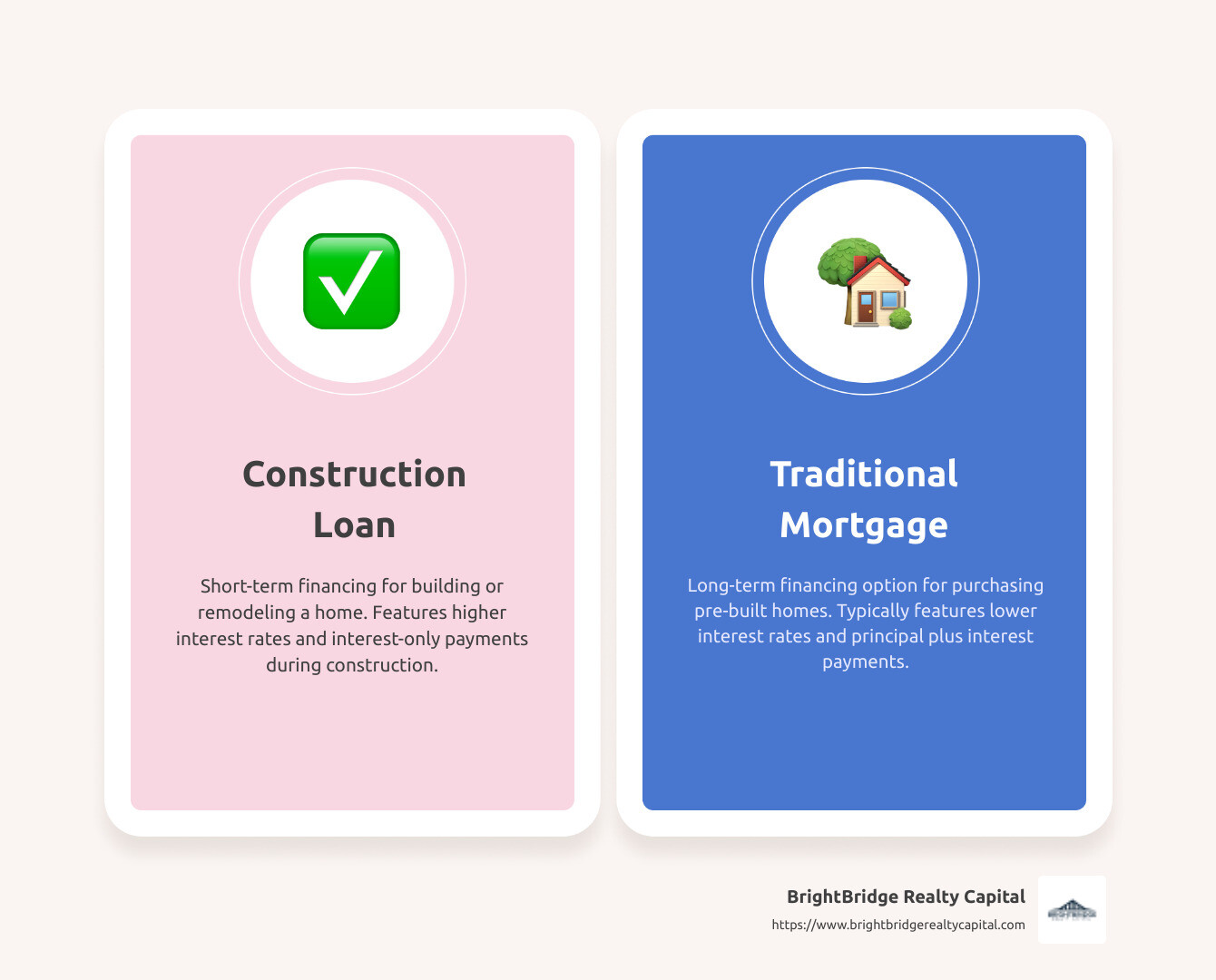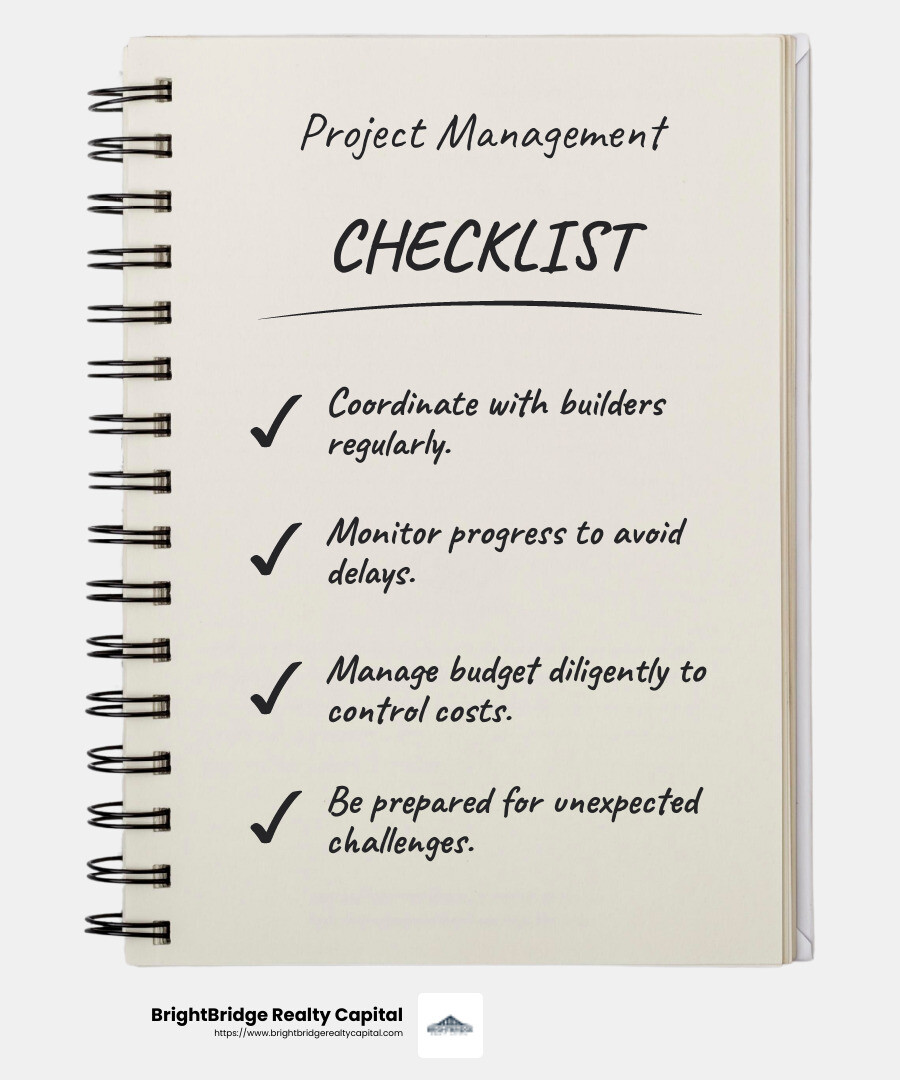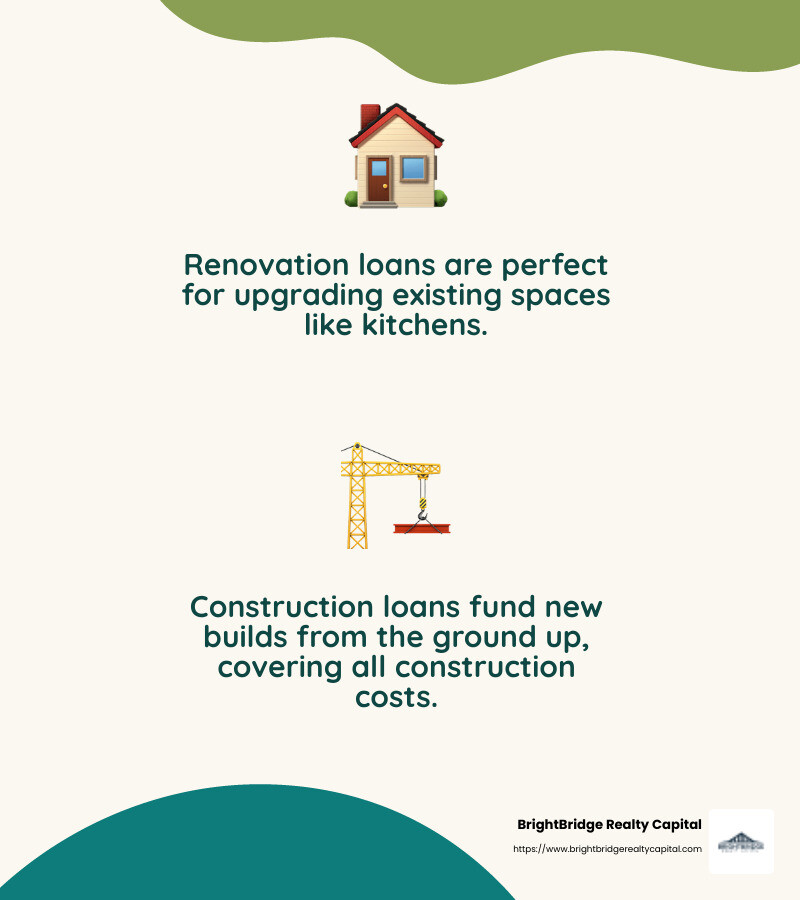Laying the Foundation: A Guide to Construction Loans in Real Estate

What is a construction loan in real estate? At its core, a construction loan is a short-term financing option that covers the cost of building or extensively remodeling a home. Here’s a quick glance:
- Purpose: Fund construction or major renovation of a property
- Duration: Typically one year
- Interest Rate: Usually higher than traditional mortgages
- Repayment: Interest-only payments during construction
- Conversion: Can convert into a permanent mortgage
In the busy world of real estate, finding the perfect home isn't always about spotting a "For Sale" sign. For some, it involves visualizing a dream home and building it from the ground up. That's where construction loans come in handy. They provide the necessary funds to make these dreams a reality, offering a flexible solution for building custom homes or extensive renovations.
However, these loans are distinct from traditional mortgages. They are inherently riskier, yielding higher interest rates and requiring detailed construction plans to secure approval. These loans only span the construction period, typically around a year, and cater to those who want to build a home custom to their specific desires.
Considering a construction loan involves understanding its benefits and trade-offs, and determining if it's the right fit for your real estate ambitions.

Quick look at what is a construction loan in real estate:
What is a Construction Loan in Real Estate?
Types of Construction Loans
When diving into construction loans in real estate, it's important to understand the different types available. Each serves a unique purpose, custom to various building and renovation needs.
Construction-to-Permanent Loans:
This type of loan starts as a construction loan and then automatically converts into a permanent mortgage once construction is complete. The main advantage here is that you only have to go through the closing process once, saving on time and fees. This option is ideal for those planning to live in the home long-term.Stand-Alone Construction Loans:
These are short-term loans that cover only the construction phase. Once the home is built, you'll need a separate mortgage to pay off the construction loan. This might be a good fit if you want to shop around for the best mortgage rates after construction is complete, but be prepared to go through two separate closing processes.Renovation Loans:
If you're planning to overhaul an existing property rather than building from scratch, a renovation loan might be a better fit. These loans can cover the costs of significant home improvements and updates, making them a flexible option for those looking to modernize an older home.
How Construction Loans Work
Construction loans operate quite differently from traditional mortgages. Here's a breakdown of how they function:
Disbursement:
Unlike a regular mortgage, where you receive the full loan amount upfront, construction loans are disbursed in phases. Funds are released as the construction progresses, ensuring that money is available when needed for different stages of the build.Interest-Only Payments:
During the construction phase, borrowers typically make interest-only payments. This means you're only paying interest on the money that's been disbursed so far, not the total loan amount. This can ease the financial burden while the home is still under construction.Drawdown Schedule:
The disbursement of funds follows a drawdown schedule, which aligns with the project's timeline. Builders or contractors receive payments in installments as they complete predefined milestones, such as laying the foundation or installing the roof.
By understanding these elements, borrowers can better steer the complexities of financing their dream home. Whether you're building from scratch or renovating an existing property, choosing the right type of loan and knowing how it works is crucial for a successful project.
Eligibility and Requirements for Construction Loans
Construction Loan vs. Traditional Mortgage
When considering construction loans in real estate, understand how they differ from traditional mortgages. The eligibility criteria and requirements for these loans can be more stringent due to the inherent risks involved in building a new home.
Credit History:
Lenders typically require a higher credit score for construction loans compared to traditional mortgages. A score of at least 680 is often needed, although some programs, like FHA loans, may accept lower scores. A solid credit history with no late payments or derogatory marks is crucial. This reassures lenders of your reliability to repay the loan.
Down Payment:
Construction loans generally demand a larger down payment. While a traditional mortgage might require as little as 3.5% down with an FHA loan, construction loans often require a minimum of 20%. This higher requirement reflects the increased risk to the lender since there is no existing property to serve as collateral.
Construction Plans:
A detailed construction plan is a must. Lenders want to see a clear outline of the project, including architectural drawings, floor plans, and a comprehensive budget. This ensures that the borrower is prepared and that the project is feasible within the loan term.
Interest Rates:
Interest rates for construction loans are typically higher than those for traditional mortgages. The lack of existing collateral and the uncertainty of construction timelines contribute to this. Rates can be 1% to 5% more than regular mortgage rates, reflecting the added risk lenders take on.
Repayment Terms:
Construction loans are usually short-term, often lasting no longer than 12 months. During this period, borrowers make interest-only payments. Once construction is complete, the loan may convert into a standard mortgage, or the borrower might need to refinance into a new mortgage.
Collateral:
Unlike traditional mortgages, where the home itself serves as collateral, construction loans have no existing structure to back them up. This makes them riskier for lenders, which is why they require a detailed construction plan and a significant down payment.
By understanding these differences, borrowers can better prepare for the application process and increase their chances of securing financing for their construction projects.
Benefits and Risks of Construction Loans
When considering construction loans in real estate, it's important to weigh the benefits and risks to make an informed decision. These loans offer unique opportunities but also come with their challenges.
Benefits
Customization
One of the biggest advantages of construction loans is the ability to customize. Borrowers can design and build a home custom to their specific needs and preferences. Whether you want a unique floor plan, specific materials, or energy-efficient features, a construction loan can make it possible.
- Personalized Design: Create a home that matches your lifestyle.
- Modern Features: Incorporate the latest technology and sustainable practices.
- Location Flexibility: Choose the perfect plot of land for your dream home.
Risks
Higher Interest Rates
Construction loans often come with higher interest rates compared to traditional mortgages. This is due to the increased risk for lenders, as there is no existing property to serve as collateral.
- Variable Rates: Rates can fluctuate, impacting your monthly payments.
- Costly Over Time: Higher rates mean more interest paid over the loan term.
Project Management
Building a custom home requires careful project management. From coordinating with builders to ensuring the project stays on schedule and within budget, borrowers must be prepared for the challenges of managing a construction project.
- Time-Consuming: Regular oversight and communication with contractors are necessary.
- Unexpected Delays: Weather, material shortages, or other issues can slow progress.
- Budget Management: Keeping costs under control requires diligent planning and monitoring.

Despite these challenges, many find the benefits of customization and creating a dream home worth the effort and risk. Understanding these aspects can help borrowers steer the process more effectively and make the most of their construction loan.
Frequently Asked Questions about Construction Loans
When Does a Homebuyer Need a Construction Loan?
A construction loan is essential when you're planning to build a custom home, especially if it's outside a typical subdivision. Unlike buying a house from a developer, building on your own means you need to finance the construction yourself. This is where a construction loan comes in handy. It provides the necessary funds to cover costs like land, labor, and materials.
- Custom-Built Homes: If you want a home custom to your exact specifications, a construction loan is the way to go.
- Outside Subdivisions: Building in a unique location, away from pre-planned communities, often requires individual financing.
What's the Difference Between a Renovation Loan and a Construction Loan?
Renovation loans and construction loans serve different purposes, though they might seem similar at first glance. A renovation loan is for upgrading an existing home, while a construction loan is for building a new one from scratch.
- Renovation Scope: Renovation loans are ideal for projects like kitchen remodels or adding a new room. If you have equity in your home, you might even consider a home equity line of credit (HELOC).
- Construction Purpose: Construction loans are for new builds, providing funds to cover the entire construction process.

Is a Construction Loan Harder to Get Than a Mortgage?
Yes, obtaining a construction loan is typically more challenging than a traditional mortgage. Here’s why:
- Paperwork: Construction loans require detailed construction plans, budgets, and timelines. You'll need to show that you have a qualified contractor and a well-thought-out project plan.
- Down Payments: Expect to make a larger down payment, often around 20%, compared to traditional mortgages.
- Interest Rates: These loans usually have higher interest rates, reflecting the increased risk for lenders since there isn't an existing home to serve as collateral.
Despite these problems, many people find that the ability to create a custom home makes the extra effort worthwhile. Understanding these requirements can better prepare you for the application process.
By exploring these FAQs, potential borrowers can gain a clearer understanding of when and why a construction loan might be the right choice for their home-building journey.
Conclusion
In real estate financing, construction loans stand out as a unique tool for those looking to build their dream home. They provide the necessary funds to cover building costs, from land acquisition to labor and materials. However, they also come with their own set of challenges, like higher interest rates and detailed paperwork requirements.
At BrightBridge Realty Capital, we specialize in offering real estate financing solutions that cater to the unique needs of investors and homebuilders. Our expertise in fast, flexible funding ensures that you can seize opportunities as they arise, without the delays often encountered in traditional lending processes.
One of our standout features is our commitment to fast closings. We understand that time is of the essence in real estate, and our streamlined process often allows us to close deals within a week. This quick turnaround can be crucial in keeping your project on track and avoiding costly delays.
By choosing BrightBridge Realty Capital, you're not just getting a loan; you're gaining a partner in your real estate journey. Our team is dedicated to providing direct lending solutions without the hassle of intermediaries, ensuring competitive rates and a seamless experience.
If you're ready to explore how our construction loans can support your next project, visit our website to learn more. Let's lay the foundation for your success together.


